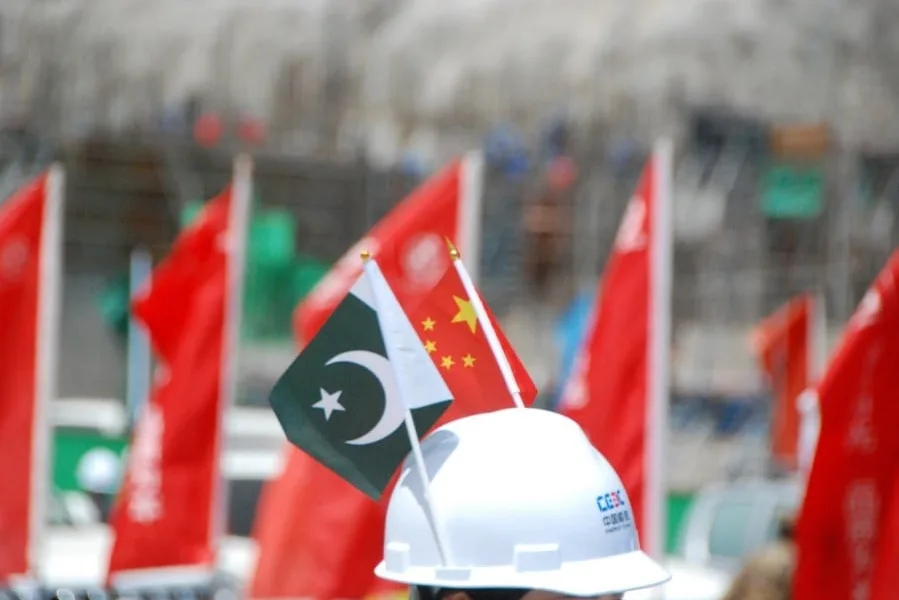In an unprecedented move exposing Pakistan's crumbling control over its territory, China has requested approval to deploy its own security forces inside the country. Beijing's drastic proposal aims to protect the estimated 1,200 Chinese workers currently stationed in Pakistan, helping construct vital infrastructure and educational facilities tied to the Belt and Road Initiative's (BRI) $60 billion China-Pakistan Economic Corridor (CPEC). A sustained campaign of deadly militant attacks targeting Chinese nationals has claimed numerous lives in recent years despite Pakistan's supposed commitment to CPEC's success as the BRI's flagship investment program. Just last month, a suicide bomber rammed an explosive-laden vehicle into a bus carrying Chinese engineers in Balochistan province, killing five people.
Islamabad nearly accepted Beijing's security deployment demand back in 2016 under then-Prime Minister Nawaz Sharif's tenure. However, the plan was ultimately scuttled by Pakistan's powerful military establishment, led at the time by Army Chief Raheel Sharif. Instead, Sharif created a new 12,000-strong Army and Navy unit dedicated to protecting CPEC projects and personnel. Yet this massive security force has continually proven incapable of fulfilling its core mission, plagued by lapses such as transporting Chinese workers in vulnerable, unsecured buses easily targeted by militants.
The fundamental issue is that Pakistan's government and military have steadily deprioritised CPEC security in recent years as they juggle intensifying domestic political and economic crises. Both are increasingly open to courting other foreign investors—even in regions like Balochistan, once effectively "reserved" for Beijing's strategic interests.
This rising indifference to Chinese safety concerns among Pakistan's leadership is striking, given the massive economic leverage Beijing wields over its "all-weather ally." With roughly $67 billion in outstanding loans, continued Chinese forbearance and bailouts have proven vital to averting Pakistan's disastrous sovereign debt default. Yet Prime Minister Shehbaz Sharif's government persists in issuing hollow assurances, vowing after the Balochistan attack to do "everything required for the security of Chinese personnel and projects" while failing to follow through. Siddiqa states that Pakistani police and CPEC security units frequently find themselves diverted to domestic political suppression tasks rather than protecting Chinese interests.
Given this stark pattern of negligence and emboldened militancy threatening its citizens operating in Pakistan, Beijing appears to have lost all faith in Islamabad's capacity or willingness to uphold basic security. Deploying dedicated Chinese paramilitary or private security contractors alongside BRI projects may offer the only viable path to safeguarding its personnel and investments going forward.
However, this solution merely formalises a neocolonial dynamic in which the CPEC's funding source nation must establish armed enclaves across its investment destinations to create minimum safe operating environments. It fundamentally violates core BRI principles of mutual prosperity between partners by demanding hard security commitments typically associated with foreign military occupations.
The need to furnish such aggressive security logistics and infrastructure threatens to fuel rising neo-colonial criticisms already swirling around Beijing's ambitious connectivity vision. It provides rhetorical ammunition to those portraying the BRI as a design for debt book diplomacy and hegemonic expansionism under the window-dressing of mutually beneficial development.
Within Pakistan as well, any visible presence of armed Chinese security forces could inflame simmering accusations of being a "client state" subordinate to Beijing's strategic whims. Baloch separatist groups already condemn Pakistani forces as enabling foreign control and pillaging local resources through projects like CPEC's Arabian Sea port at Gwadar.
Continued high-profile attacks on Chinese citizens despite heavy militarisation of the CPEC corridor could also significantly tarnish the BRI's brand and Beijing's reputation as a partner for developing nations to court. While domestic security challenges vary across BRI host countries, regular images of Chinese workers being targeted erode narratives promoting the initiative's promise of win-win gains for all.
Suppose the situation in Pakistan grows too unstable and costly to manage even with private armed details or paramilitary deployments reliably. In that case, Beijing may re-assess the prudence of bankrolling such risky geopolitical foothold projects. The funds and military logistics required to protect citizens and assets across the BRI's vast transcontinental footprint already strain China's resources. Pakistan's consistent inability to cultivate an environment enabling Chinese firms to operate unhindered has deprived the CPEC of opportunities to uplift its growth trajectory truly. While the corridor provided new infrastructure, most projects still lack broader productive economic purposes or ties to Pakistan's industries beyond simple cosmetic existence.
Islamabad prioritised cementing security ties to Beijing over the socio-economic reforms, transparency, and consensus-building required to translate physical infrastructure upgrades into sustainable development gains. Endemic corruption, militancy, and hasty land expropriations imposed heavy disruption costs that offset many of the CPEC's intended benefits. As a result, Pakistan surrendered immense potential economic and political windfalls from facilitating the BRI's flagship project through its territory. Confidence in the country's viability as a trusted node for future phases is eroding rapidly among Beijing's planners.
In fact, China has already begun pivoting toward bypass routes like the recently operationalised Gwadar-Sohar sea line linking CPEC port terminals to logistics hubs in nearby Oman — seen as a safer haven during bouts of unrest or militancy along the overland corridors transiting Pakistan. While unlikely to sever ties entirely given their extensive military and strategic linkages, Beijing clearly views Pakistan as an increasingly unstable bottleneck risking deeper BRI expansion. The growing need for overt security deployments adds major financial and operational strains to the costs already plaguing CPEC construction.
Unless Pakistan accomplishes real governance and security reforms enabling a restoration of order, the "all-weather friendship" appears destined to evolve into a militarised constabulary arrangement with Islamabad increasingly subordinate to Beijing's security priorities and diktats. For a nation that prides itself on sovereignty above all else, this outcome would represent a truly humiliating loss of control over its own destiny.
READ MORE: Erdogan-Biden Meeting Remains Uncertain.


